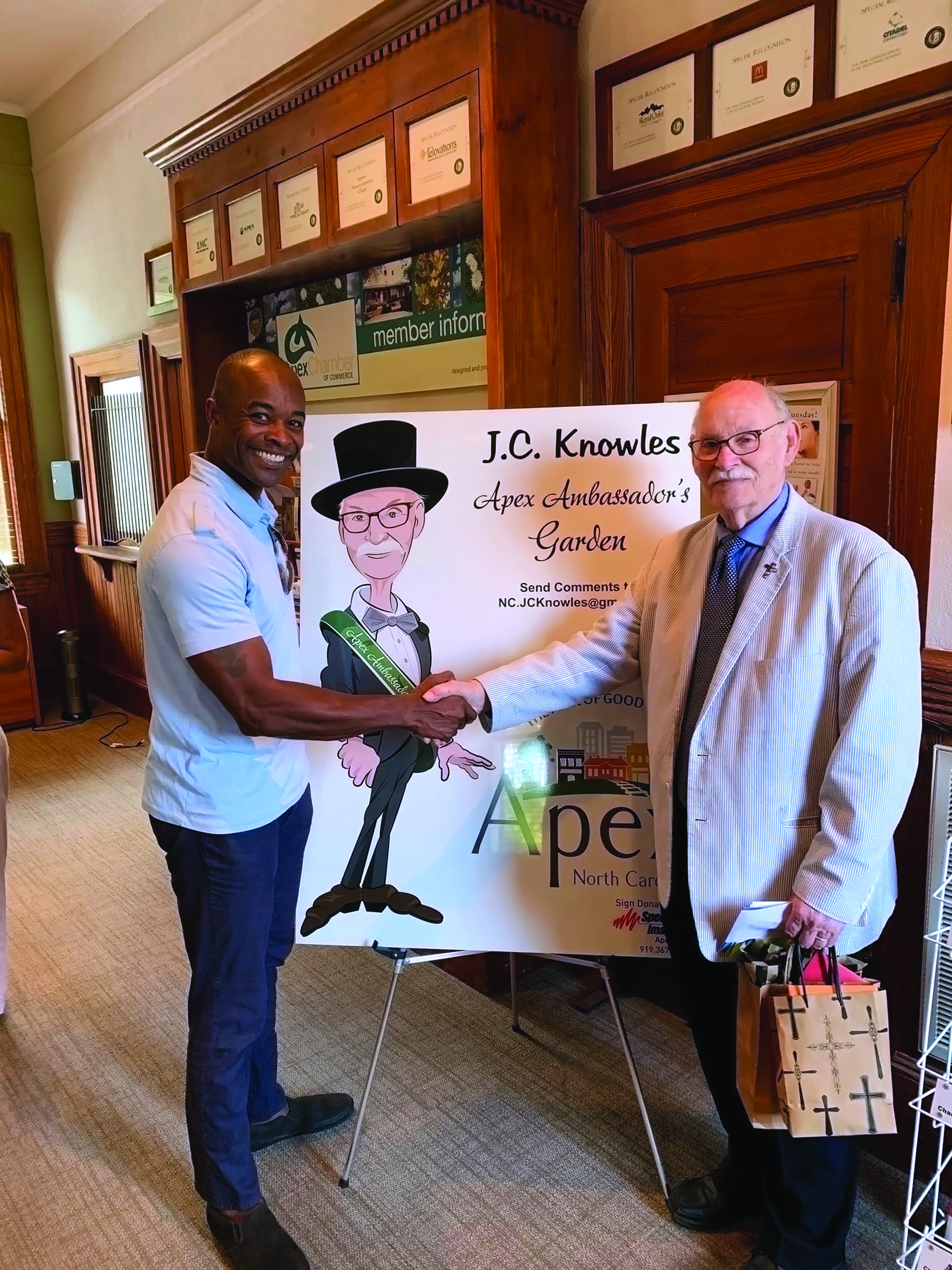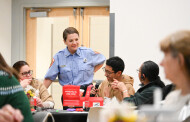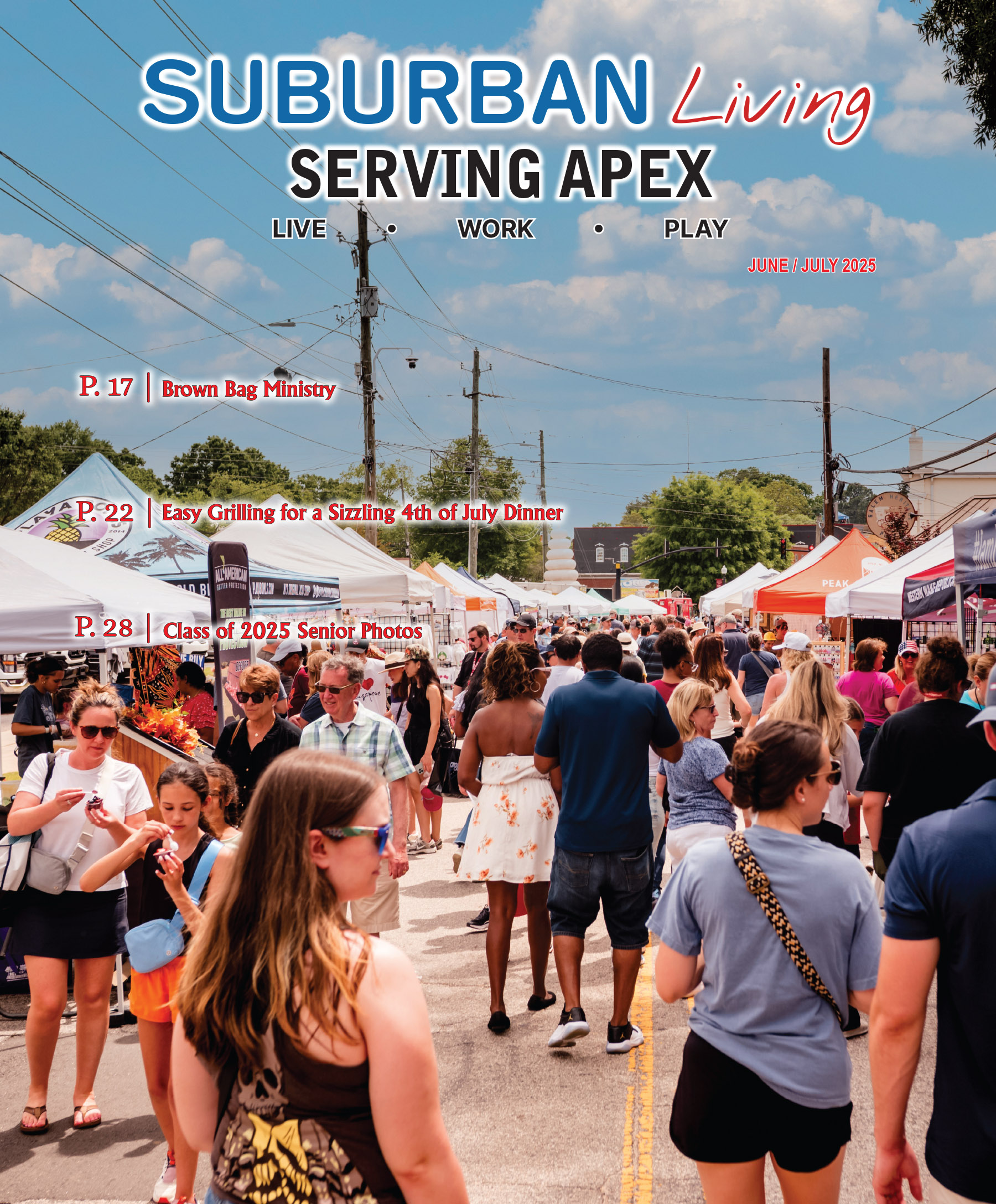Interviewing JC Knowles for the first time is like being told a secret that everybody else already knows. I’d seen his picture and heard his name. I’m even friends with his daughter Janet. But to be welcomed into his home, meet Dollie his wife, and sit at their dining room table and get to know him made for a memorable morning. Between his lyrical drawl and my love of a fascinating life story, I could have spent all day asking questions. With JC, there are layers upon layers of memories to explore, and at 93 he hardly skips a beat in his storytelling.
Born on June 28, 1928, in the town of Wallace in Duplin County, JC and his twin sister, Ruby Lee, were raised and educated at Oxford Orphanage. As a young man, he served our country in the Merchant Marines and the U.S. Army before embarking on a journey that would bring him to Apex.
Depending on who you talk to, JC Knowles is a businessman, an auctioneer, a school board member, an historian, an educator, a North Carolina scholar, a Sunday School teacher, an antiques appraiser, a publisher, a writer, a radio show host, an innovator and an influencer. He has received countless local and state awards, including the prestigious Order of the Long Leaf Pine bestowed upon him by Governor Beverly Purdue, and he’s a devoted husband, father and grandfather. The title for which JC is most widely known, however, is Apex Ambassador.
SL: What brought you to Apex?
JC: When I was in the second grade at the orphanage, we had a little toy band. We came to Raleigh and played for 30 minutes over WPTF. We brought two peanut butter sandwiches and later they sent down to what was known as the California Fruit Store to get us a soft drink. We sat in Capitol Square and ate our lunch. And then we went to the bathroom to wash our hands because Miss Peacock, our teacher, said, “You children are going to shake hands with Governor Clyde Hoey and we don’t want him to get peanut butter all over him.”
We single filed through the Rotunda of the Capital and shook hands with that man. He didn’t wear a necktie; he wore a scarf-like thing and had beautiful gray hair and a long split tail coat. To me, I shook hands with deity in the great marble hall. He gave each one of us a nickel. I may have held a penny or two for Sunday school at the orphanage, but that’s the first time somebody gave me money. It was to buy peanuts with to feed the squirrels and the pigeons on the square, but I snuck around the building and I ate mine and when I came back I got caught. “Where you been? Where are your peanuts?” I got a whippin’ for it. Then we went down to the News and Observer and we shook hands with Josephus Daniels. [After that], I always said, “When I grow up, I’m gonna go to that town and live.”
When I got out of the army, I came to Raleigh and I got a job with a surgical supply company. My territory was all the way down US Number 1 to South Carolina, west to Charlotte, east to Wilmington. Traveling Old US1 back in those days, you had to go right through downtown Apex. For some reason or another I was on a three-week itinerary. Two of those weeks, I would wind up on Friday in Apex to call on the doctors there. I had lunch at Baucom’s drugstore. They were so used to me, as soon as I’d walk in the door, they’d say, “We got it working, JC.” I’d always get a pimiento cheese sandwich and a Pepsi-Cola.
I left [that company] after nine years and I was assistant administrator of Richmond County Hospital in Rockingham. That was a political job, so I quit. But I was lucky. I was hired as executive director of the North Carolina Academy of Family Physicians, which was a statewide organization, and we met in Apex every month. We felt like it was a central point for the doctors in Sanford, Pittsboro, Raleigh, Cary, Fuquay… to have seminars. So, I would come out and that was always a great treat for me to get into Apex.
We first met in Spain’s restaurant on 55. And then we met at the Ramada Inn when Spain’s closed down. I was with the Academy for 13 years. I moved from Rockingham to Raleigh and I had an office downtown. I met a man, Robert Williams, who was an auctioneer, and I had breakfast with him two or three mornings a week. I got started helping him on the weekend with his auctions. I started auctioning and wound up I was an auctioneer for 42 years. I went into auctioning full-time, and my wife wanted to move out in the country, so we looked around and found a house. I thought my address would be Raleigh but it’s Apex so I said, “Well, Apex is going to be my base.” About 1985, I opened up an antiques shop in downtown Apex, Knowles Antiques, and I kept it for about five years. It was hard to get somebody to work that knew anything about antiques and I was gone, setting up auctions all the time, so I had to quit it. About 2004, I retired from [auctioning].
SL: What was Apex like in those early days?
JC: Back in those days, of course, stopping to eat lunch and that sort of thing, I’d buy my clothes there. Apex was, I would call it, a quaint little town. They had two grocery stores; they had a shoe store. They had everything that, let’s say, when the farmer came to town on Saturday, Apex had everything they needed right down Salem Street. The Apex Grocery, they sold farm equipment, and farm [supplies]. The Martin’s Grocery Store, he sold fertilizer and other stuff. So, they had everything they needed. And everybody was happy.
SL: Who would you say has influenced you the most in your life?
JC: Probably the 13 years I spent at Oxford Orphanage, because I realized that I was given a chance that I may not have gotten because of the Depression years. My daddy suffered for three years with cancer before he died. He had two nodules growing in his chest. They couldn’t remove them. He had five total, but the two main ones in his chest grew so big they squeezed his heart to death. I can remember my mother telling me at the time of his death, he had 32 shots of morphine in him. That’s all they could do for him.
My mother fell through a porch and it crippled her. She got to where she could get around pretty good, but she never regained from it. But with five other children, it was, I just say, impossible. The Masons in Wallace, my dad was a Mason and very active in his lodge, they told my mother, “We can put those children at Oxford Orphanage and give them an education.” We went there in 1930. In 1943, our mother was still living and she asked for us, and I never knew why. I asked her many, many times, “Mother, why did you pull us out of the orphanage?” She never would say. And that’s the biggest mistake she ever made in life. I won’t talk about it, but my home life was so bad that I just quit school and joined the Merchant Marines.
The worst disappointment of my life is that I never was able to finish high school. My greatest lesson in life is that God is in control. I’m not perfect, I sin just like everybody else, but if you follow the Lord, you can overcome any obstacle in life. I believe that. But one of my disappointments was not finishing school.
SL: If you could go back in time and re-live one day, what would that day involve?
JC: Probably the greatest incident of my life that I will never forget was when I was in the Merchant Marines. I went to Italy, a 17-year-old boy, and I stood next to the top of the Leaning Tower of Pisa. Now, here’s a kid fresh out of the orphanage and one of the great wonders of the world. I’ll never forget that as long as I live. This was in 1945, on my first trip to Italy. They didn’t promote tourism at that time, but they had a guard there. Of course, I gave him the story… “I was raised in an orphanage…” and I said, “I’d like to go up in it.” He said, “Well, I’m going around to the Baptistery and if you go on up there, please be careful because I could lose my job.” I couldn’t go up on the very top; I went next to the top. I stayed there and looked out and I’ll never forget that.
SL: Of all the inventions and innovations you’ve seen over the last 93 years, which have you admired or enjoyed the most?
JC: Probably the Internet. I do a lot of research. I consider myself still going back to school when I go to the internet to look up something. I get a daily thing from the History Channel, things that happened on this day in history, and you can plug into it and they give you the full story. But I wouldn’t be able to get that if it wasn’t for the internet.
SL: Did you have a hero growing up?
JC: A black lady, I believe her name was Polly. I had a twin sister. She died several years ago. She was born first; I was born second. But they didn’t know whether I was going to live or die. My daddy was dying with cancer, my mother was crippled and had four other sons and another daughter, and it was 1928 with the Depression coming on and all of this. My mother’s milk dried up and I was nourished from the breast of a black lady. She saved my life. When I was 17 years old, I went to see my older sister and she said, “Come on, I want to take you somewhere.” She took me up to this house, and there was a black lady sitting on the porch. I had no idea who she was. We stood at the foot of the steps and [my sister said], “Polly, do you know who this is?” She looked at me and she said, “Oh, my God, is that one of my children?” She come off of that porch and we hugged and cried for an hour.
After we left, my sister told me the whole story. I was in the Merchant Marines at that time, and when I came back off of a trip, I asked my sister, “I want to go see her” and she said, “JC, she died last year.” So, I got a chance to see the woman that saved my life. I wouldn’t be talking to you today if it wasn’t for her, according to my family.
SL: If I could promise you a “perfect day,” what would that day involve?
JC: I lived at Carolina Beach three summers and my dearest friends were the people that owned Britts Donut Shop. Their son and I, we ran around together all the time. So, my perfect day would be to take my wife one more time to Britts Donuts in Carolina Beach. We haven’t been in years. Harvey Jr. who I ran around with, he died with cancer and, of course, his mother and dad have been gone years. After we got married, we went to Carolina Beach every summer and they’d let us stay in their uptown apartment. Never charged us a dime. They considered me a son. But to relive that one more time would be a treat.
SL: After 67 years of marriage, what would you say are the secrets to long life and a happy marriage?
JC: Just sayin,’ “Yes, ma’am.” And this is not original with me, “Never go to bed mad with one another.” We never went to bed mad with one another; we stayed up a lot of nights fighting, but we didn’t go to bed mad. Actually, I just think realizing who she was, realizing who I was, the way she was brought up. They didn’t have electricity in her home until she was a senior in high school. And we just work with each other.
Dollie grew up in Sampson County, little town called Ingold; if you blink your eyes, you missed it. We met on a blind date. There were three of us that lived at the YMCA in Raleigh and right across the street was Vance Apartments. There was a bunch of single girls that lived there. We had made arrangements that Sunday night for three of them, we were going to go to the movies. Well, one of them backed out. [I said,] “Y’all go on because I’m going to church” and they said, “No, we’re going to take the nine o’clock movie when you get out of church.” And so, they called Dollie and she agreed to go. That’s how I met her. We dated a while, but she got tired of my foolishness. And then they were having a company Christmas party. She worked for the highway department downtown. The people that worked there, they told her, “You got to get you a date for it.” So, she finally called me. And from then on, that was it.
I bought the ring. Easter Sunday, we went to an outdoor theater for the sunrise service. And that was when I was gonna give her the ring. It was cold; I mean cold. She had a coat on and her gloves on. I said, “Take your gloves off.” She said, “I’m not gonna do it. I’m cold.” “Please,” I said, “take your gloves off.” So, she took it off and I slipped a ring on her finger. She didn’t know I was gonna do it and she was disgusted with me for making her take her gloves off. But I said, “Honey, I want to marry you. Will you marry me?” She didn’t say a word. We went to breakfast and I said, “I’ll ask you this question—will you marry me?” She said, “I guess so.” We were married on national television on July 21, 1954, in New York City. We’ve had a happy life. Raised two wonderful children—Janet and Sarah. Both schoolteachers. We have three grandchildren. Janet has one and Sarah and Greg have two.
SL: Do you have a favorite “guilty pleasure?”
JC: It’s a cake Sarah makes for me. You take biscuits and break them up and put syrup on all that—monkey bread. That’s my favorite.
SL: How would you describe your role of “Apex Ambassador” to someone new in town?
JC: As the Apex Ambassador, I’m always looking for ways to improve the town. My garden downtown, right there on the corner of Saunders and Salem Street, is called the Ambassador’s Garden. About six or seven years ago, it was just a tree. There were bushes. Nobody attended to it. It looked terrible. So, I asked the town, could I use it as a garden? I’ve been decorating it now for six or seven years. And that little library, I got that started.
The Apex Rotary Club and the Sunrise Rotary Club used to give their speakers a certificate saying, “Thank you,” and I got both clubs to start giving a book in the speaker’s honor. The Apex Rotary gives a book to Apex Elementary and Sunrise gives it to AV Baucom. I furnish the books and fix a little tab for it that says: This book is donated to Apex Elementary/AV Baucom in honor of [the speaker].
I go to the ribbon cuttings, grand openings, and I go to festivals. I go to as many of the town functions as I can to greet people to let them know that there’s somebody in Apex that wants them to participate in the Peak of Good Living.
I don’t get paid for it, it’s a voluntary thing, and I was shocked when they made me the ambassador, but what I would like to tell the people in Apex: If you have to get involved in politics, get involved as a neutral participant and let’s make Apex truly the peak of good living. I try to promote civic clubs because these do so much good for Apex, and it’s a way they can contribute. So, I would like to see everybody in Apex take it seriously so that they can make Apex a better place. But it’s gonna take them to do it. You can’t leave it up to somebody else. YOU’VE got to do it.
We asked two prominent Apex leaders to share what comes to mind when they hear the name JC Knowles.
Chamber of Commerce Executive Director Shannon Flaherty said, “When it comes to JC Knowles I actually think of family. JC has supported me personally and professionally since I started working at the Apex Chamber of Commerce. He loves Apex and is such a book of knowledge of the history of our great town. He has gone above and beyond to support the Apex Chamber of Commerce and the business community as a whole. He is always willing to do what he can to continue to help make Apex be on top. JC has left a huge mark on our town and community. He is one of the finest men I have ever met!”
Mayor Jacques Gilbert shared, “Our amazing Town of Apex Ambassador JC Knowles is a living encyclopedia of Apex and North Carolina history. His life story inspires all of us to believe, never give up, and let love speak louder. When I reflect on the success of Apex and the vision forward, I believe unity is key. JC has illuminated unity in a unique way, devoting 93 years of life connecting and encouraging others, championing Apex and our great State of North Carolina. I consider him a brother who I’m blessed to know. He is the G.O.A.T. of all city and town ambassadors.”








